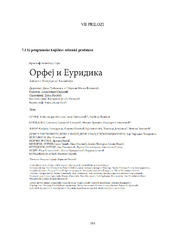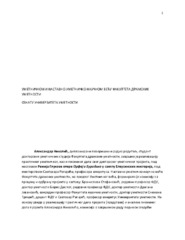| dc.contributor.advisor | Рапајић, Светозар | |
| dc.contributor.other | Стефановић, Бранислава | |
| dc.contributor.other | Деспот, др ум. Борис | |
| dc.contributor.other | Јовановић, др ум. Драгана | |
| dc.contributor.other | Тришић, др ум. Снежана | |
| dc.creator | Николић, Александар | |
| dc.date.accessioned | 2023-01-23T12:34:21Z | |
| dc.date.available | 2023-01-23T12:34:21Z | |
| dc.date.issued | 2023-06-26 | |
| dc.date.submitted | 2023-01-23 | |
| dc.identifier.uri | https://www.youtube.com/watch?v=CHklzhqIi-M | en |
| dc.identifier.uri | https://www.youtube.com/watch?v=nfnQ0CChbvA | en |
| dc.identifier.uri | http://eteze.arts.bg.ac.rs/handle/123456789/591 | |
| dc.description.abstract | Predmet umetničko-istraživačkog rada “Režija Glukove opere Orfej i Euridika u svetlu Eleusinskih misterija” je praktična primena estetike, etike i poetike Eleuisinskih misterija, te njihovog terapeutskog i duhovnog uticaja na pojedinca i zajednicu kroz Glukovu reformisanu operu Orfej i Euridika, delo velike poetske snage i u svojoj osnovnoj ideji primer teatara sinteze. Kroz teatrološke, muzikološke, analitičke, komparativne, istorijske i druge metode istraživanja je izgrađena specifična nova umetnička paleta sredstava koja je bila od suštinske važnosti reditelju, dirigentu, koreografu, scenografu, kostimografu i dizajneru svetla, a koja je preko reditelja i ostalih umetničkih rukovodilaca preneta solistima opere, horu, baletu, animatorima i orkestru, koji su ih dalje praktično primenili u izvođačkoj umetnosti, te gledaoca u našem operskom teatru sinteze doveli u specifičnu situaciju mista, posvećenika, mislioca koji doživljava katarzu. Koherentan scenski jezik predstave Orfej i Euridika je bio zasnovan upravo na istraživanjima konkretnih potencijala i izražajnih sredstava fenomena Eleusinskih misterija i Glukove reformisane opere. Ova sredstva komuniciraju sa gledaocem jezikom koji je univerzaln i blizak svakom pojedincu u zajednici, te omogućava duboko povezivanje gledaoca sa predstavom i visoku emotivnu involviranost u nju. Iako su u pitanju Misterije, akcenat je na demistifikaciji, terapeutskom rasterećenju, duhovnom miru i zadovoljstvu. S obzirom da se radi o praksama starim od nekoliko stotina do nekoliko hiljada godina taj jezik i ta izražajna sredstava moraju biti transponovana da bi zadovoljila potrebe savremenog gledaoca. Univerzalnost i svevremenost svakako jesu jedan od zadataka naše scenske postavke kao što i sam Gluk potencira u svom radu, a Misterije u svojoj poruci. Praktična primena zaključaka umetničko- istraživačkog rada ima za cilj da praktično služi našoj postavci Orfeja i Euridike koja odgovara na probleme i pitanja savremenog gledaoca, sada i ovde. Paleta sredstava koju smo kroz istraživanje razvili odvodi savremenog gledaoca (koji jeste individualist i homeocentrični Orfej) u predele kolektivnog nesvesnog i arhetipskog, duhovnog, misterioznog, nedokazanog (kao što to fon Trir čini u svojom Antihristu), što jeste jedan od osnovnih ciljeva ovog naučno-umetničkog istraživanja.
Pronalazak jasnih komunikacijskih kodova sa publikom, koju su autor predstave, umetnički saradnici i izvođači usvojili i primenili u postavci predstave, imaja za cilj da celokupan sadržaj istraživanja ima stvarnu praktičnu primenu i terapeutsku funkciju za gledaoca. | en |
| dc.description.abstract | The subject of artistic-research thesis “Direction of Gluck’s opera Orpheus and Eurydice in the light of Eleusinianmysteries” is a practical application of aesthetics, ethics and poetics of the Eleusinian Mysteries and their therapeutic and spiritual impact on individual and community through Gluck’s reformed opera Orpheus and Eurydice, a piece of great poetic power and in its fundamental idea an example of a theatre of synthesis. Through theatrological, musicological, analytical, comparative, historical and other methods of research, a specific new range of artistic means was build, of crucial importance to the director, conductor, choreographer, set designer, costume designer and lighting designer, which, through the director and other artistic collaborators, was conveyed to the opera soloists, the ballet ensemble, animators and orchestra, who further practically applied it in their respective performing arts and brought the spectators in our opera theatre of synthesis to a specific situation of a mystes, an initiate, a thinker experiencing catharsis. Coherent stage language of the production of Orpheus and Eurydice was founded on the very research of concrete potentials and expressive means of the phenomenon of the Eleusinian mysteries and Gluck’s reformed opera. These means communicate with spectators through a language that is universal and familiar to each individual within community, and enablespectators’profound connection with the performance as well as a high level of emotional involvement in it. Even though these are Mysteries, the accent here is placed on demystification, a therapeutic release, spiritual peace and contentment. Considering the practices in questions are several hundred to several thousand years old, the language and means of expression must be transposed in order to meet the needs of a contemporary spectator. Universality and agelessness, as Gluck himself insists on in his work and the Mysteries do in their message, certainly are one of the objectives of our staging. Practical application of conclusions of the artistic-research work has an objective to serve our staging of Orpheus and Eurydicein a practical way, responding to issues and matters relevant for contemporary spectators, here and now. The range of means developed through the research leads a contemporary spectator (an individualist and a homocentric Orpheus) to areas of
10
collective unconsciousness and those of the archetypal, spiritual, mysterious, unevidenced (similar towhat Von Trier does in his Antichrist), which indeed is one of the main goals of this scientific and artistic research.
Finding clear codes of communication with the audience, adopted and carried out in the staging by its author, artistic collaborators and performers, has the objective of making the overall content of the research achieve actual practical application and a therapeutic function for the spectator. | en |
| dc.language.iso | sc | en |
| dc.publisher | Универзитет уметности у Београду, Факултет драмских уметности | sr |
| dc.source | Факултет драмских уметности | sr |
| dc.subject | Eleusinske misterije, misterija, ciklus života, terapeutsko, opera, sinkretizam u umetnosti, teatar sinteze, Orfej i Euridika, Amor i Persefona, Kristof Vilibald Gluk | en |
| dc.subject | Eleusinian Mysteries, life cycle, therapeutic, opera, syncretism in art, Synthesis Theatre, Orfeo ed Euridice, Amor and Persephone, Christof Willibald Gluck | en |
| dc.title | Режија Глукове опере "Орфеј и Еуридика" у светлу Елеусинских мистерија | en |
| dc.type | other | en |



